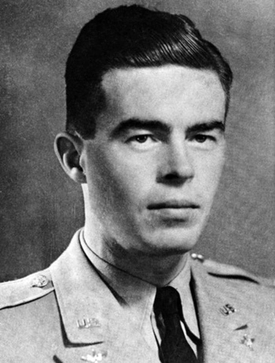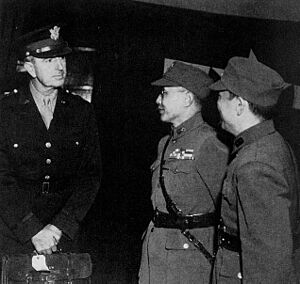John Birch (missionary) facts for kids
Quick facts for kids
John Birch
|
|
|---|---|

Captain John Birch, U.S. Army Air Forces
|
|
| Birth name | John Morrison Birch |
| Born | May 28, 1918 Landour, United Provinces, British India (now in Uttarakhand, India) |
| Died | August 25, 1945 (aged 27) Xuzhou, Jiangsu, China |
| Allegiance | |
| Service/ |
|
| Years of service | 1942–1945 |
| Rank | Captain |
| Battles/wars | World War II |
| Awards | Army Distinguished Service Medal Legion of Merit (2) |
John Morrison Birch (born May 28, 1918 – died August 25, 1945) was an American soldier and missionary. He served as a captain in the United States Army Air Forces during World War II. He was also a secret agent for the Office of Strategic Services (OSS) in China.
Birch was killed in China by Chinese Communist soldiers shortly after World War II ended. He was given the Army Distinguished Service Medal after his death. An organization called the John Birch Society was later named after him. Its founder, Robert H. W. Welch Jr., believed Birch was the first person to die in the Cold War.
Contents
John Birch's Early Life
John Birch was born in Landour, India, on May 28, 1918. His parents, Ethel and George S. Birch, were Presbyterian missionaries. They were working in India for three years. In 1920, when John was two, his family moved back to the United States. This was because his father got malaria. John was the oldest of seven children.
In the U.S., his parents joined the Fundamental Baptist church. John grew up in Vineland, New Jersey, and later in Georgia. He was a very good student and finished high school at the top of his class. He then went to Mercer University in Macon, Georgia. He graduated in 1939 with very high grades.
Becoming a Missionary
John Birch decided to become a missionary when he was twelve. After college, he went to a Bible institute in Fort Worth, Texas. He finished the two-year program in just one year. In June 1940, he graduated at the top of his class. He then prepared to go to Shanghai, China, as a missionary.
In July 1940, Birch arrived in Shanghai. This city was controlled by Japan at the time. He started learning Mandarin Chinese. A few months later, he moved to Hangzhou, which was also occupied by the Japanese. In October 1941, he traveled on foot to Shangrao to run a mission station. This area was poor and isolated. He wrote to his parents that he was doing well, even though he had been sick. He learned Chinese well enough to preach short sermons.
When Japan attacked Pearl Harbor in December 1941, Birch became very angry about Japan's actions in China. He also found it hard to stay healthy and get food in Shangrao. On April 13, 1942, he wrote to the American Military Mission in China. He said he wanted to join the Army. He explained that he had been preaching behind Japanese lines. He wanted to serve as a chaplain but was ready to do "whatever they tell me to do."
Working for the U.S. Military in China
In April 1942, Lieutenant Colonel Jimmy Doolittle and his team landed in China. They had just completed the first air attack on Japan, known as the Doolittle Raid. John Birch helped rescue Doolittle and his crew. He found them hidden in a riverboat and helped them escape Japanese lines.
When Doolittle met Brigadier General Claire Lee Chennault, he told him about Birch's help. Chennault was the commander of the Flying Tigers. He needed an American who spoke Chinese and knew the country well. After talking with Birch, Chennault made him a second lieutenant on July 5, 1942. Birch became a field intelligence officer for Chennault's forces. He joined the 23rd Fighter Group, which took on the "Flying Tigers" nickname.
Birch worked for Chennault's air force, which later became the Fourteenth Air Force. He often worked alone or with Chinese soldiers. He risked his life in areas controlled by the Japanese. His jobs included:
- Setting up spy networks with Chinese people.
- Giving Chennault information about Japanese troop movements and ships.
- Rescuing American pilots whose planes had crashed.
- Building emergency runways for aircraft.
- He also continued to hold church services for Chinese Christians.
For his brave work, he received the Legion of Merit award in July 1944. Birch refused to take a break, saying he would not leave China until the last Japanese soldier did.
By 1945, Birch was a captain. He was moved to the U.S. Office of Strategic Services (OSS). This was America's spy agency during World War II. Even after the war officially ended on August 14, the Japanese army was ordered to stay in some areas. This was until the Chinese Nationalist government could take over. This led to more fighting, especially with Chinese Communist forces.
John Birch's Death
After Japan officially surrendered on August 15, 1945, OSS agents were sent to northern China. Their job was to accept the surrender of Japanese commanders. The Chinese Communists controlled many of these areas. They were supposed to be allies with the U.S. but were not allowed to accept the Japanese surrender. Birch told a friend he wasn't worried about going into Communist areas. He had worked with them before without much trouble.
On August 20, Birch left Xi'an for Xuzhou. He was leading a group of American soldiers and Chinese officers. Their mission was to get Japanese documents and information about airfields. This information would help fly out American prisoners of war. The group traveled by foot, boat, and train.
On August 24, their train was stopped because the tracks were damaged. Birch and his group continued by a small railcar. On August 25, they met about 300 armed Chinese Communists. Birch, wearing his Army uniform, refused to give up his weapon. After an argument, they were allowed to pass. Further on, they met more Communists who were tearing up tracks.
When they reached the Huangkou railway station, which was held by Communists, Birch and his aide, Lieutenant Tung, met the Communist leader. Birch again refused to give up his pistol. Tung, who was unarmed, was ordered to be shot. Then, Birch was also ordered to be shot, even though his pistol was still in its holster. The rest of Birch's team were taken prisoner.
Chinese farmers later took Birch's body to a hospital in Xuzhou. Lieutenant Tung survived his shooting. Birch was buried in Xuzhou with full military honors. He was one of five OSS soldiers killed in combat in China during the war.
Military Awards
Captain John Birch received several military awards for his service:
- Distinguished Service Medal
- Legion of Merit (with an oak leaf cluster, meaning he received it twice)
- Army Presidential Unit Citation
- American Campaign Medal (with a star)
- Asiatic-Pacific Campaign Medal (with four stars)
- World War II Victory Medal
- Republic of China Medal of the Armed Forces
- Republic of China Order of the Cloud and Banner
- Republic of China War Memorial Medal
The John Birch Society
John Birch is mostly known today because of the organization named after him, the John Birch Society. This group was started in 1958 by Robert W. Welch Jr. He was a retired candy maker and a strong anti-communist. Welch wrote a book about Birch in 1954. He named the society after Birch because he saw Birch as a dedicated anti-communist and the first person to die in the Cold War.
Jimmy Doolittle, the general Birch helped rescue, later said in his autobiography that he didn't think Birch would have approved of the society being named after him. Welch got permission from Birch's parents to use their son's name. Both of Birch's parents became honorary members of the society.
Memorials
There are several places that remember John Birch:
- His name is on a bronze plaque at a World War II monument in Macon, Georgia.
- There is a plaque for him at the First Southern Methodist Church of Macon. This church was built on land his family gave, using money he sent home.
- "The John Birch Hall" is a building at the First Baptist Church of Fort Worth, Texas, named after him.
- "John Birch Memorial Drive" is a street in Townsend, Massachusetts, named in his honor.
- He also has a memorial plaque in Rose Hill Cemetery in Macon, Georgia.
Images for kids
 | Claudette Colvin |
 | Myrlie Evers-Williams |
 | Alberta Odell Jones |




